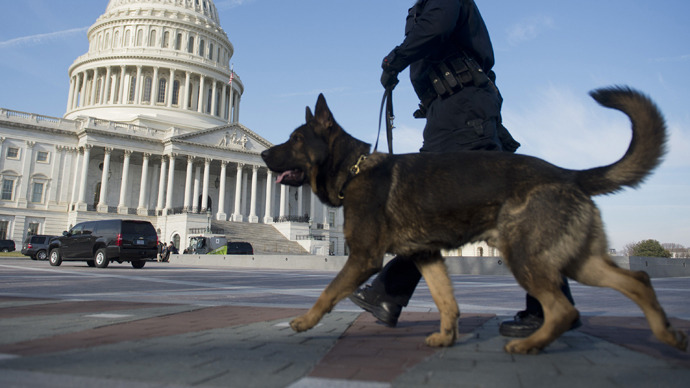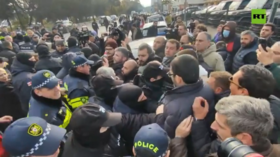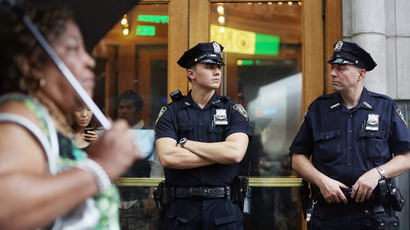Warrantless sniffing around suspect’s property ruled unconstitutional

The use of drug-sniffing dogs outside the home of someone suspected of growing drugs requires a search warrant, the US Supreme Court has ruled, declaring inadmissible all evidence obtained by a drug dog’s nose as well as human sight, sound and smell.
The use of drug-sniffing dogs outside the home of someone suspected of growing drugs requires a search warrant, the US Supreme Court has ruled, declaring inadmissible all evidence obtained by a drug dog’s nose as well as human sight, sound, and smell.
Tuesday’s decision in Florida v. Jardines will limit police, who
have long relied on the technique in trying to gain access to a
home where drugs are invisible through a suspect’s window. The
Supreme Court’s 5-4 decision threw out the 179 marijuana plants,
worth an estimated $700,000, obtained by Florida police at the
Miami home of Joelis Jardines in 2006.
“The police cannot, without a warrant based on probable
cause, hang around on the lawn or in the side garden, trawling for
evidence and perhaps peering into the windows of the home,”
Justice Antonin Scalia wrote for the majority. “And the officers
here had all four of their feet and all four of their companion’s,
planted firmly on that curtilage – the front porch is the classic
example of an area intimately associated with the life of the
home.”
Justices Clarence Thomas, Ruth Bader Ginsburg, Sonia Sotomayor
and Elena Kagagn agreed with Scalia while Chief Justice John
Roberts, Justice Stepehen Breyer, Justice Anthony Kennedy and
Justice Samuel Alito dissented, according to the Associated
Press.
In 2006 Miami-Dade police officers approached Jardines’ home
after receiving an anonymous tip that marijuana was being grown in
the house. Police obtained a search warrant after the K-9 unit
alerted them to the marijuana smell. Justice Scalia wrote that the
dog was not the problem, “but the behavior that here involved
the use of the dog.”
“We think a typical person would find it ‘a cause for great
alarm’ to find a stranger snooping about his front porch with or
without a dog,” he wrote. “The dissent would let the police
do whatever they want by way of gathering evidence so long as they
stay on the base path, to use a baseball analogy – so long as they
‘stick to the path that is typically used to approach a front door,
such as a paved walkway.’ From that vantage point they can
presumably peer into the house with binoculars with impunity. That
is not the law, as even the state concedes.”
Jardines was charged with marijuana trafficking and grand theft for stealing the electricity necessary for the grow-op. His attorney challenged the basis of the search, at which point the trial judge threw the evidence out of court. That decision was reversed in the court of appeals before the Florida Supreme Court agreed with the original trial judge.
Justice Alito, writing for the dissent, argued that a
“reasonable person” would not expect their privacy to be protected
to the point where a police detective and a dog would be considered
trespassing.
“Where is the authority evidencing such a rule?” he
wrote. “A reasonable person understands that odors emanating
from a house may be detected from locations that are open to the
public, and a reasonable person will not count on the strength of
those odors remaining within the range that, while detectable by a
dog, cannot be smelled by a human.”
On February 19 the Court unanimously agreed in the case of Florida v. Harris that police have probable cause to search a vehicle when a dog alerts them to the smell of drugs. The difference between that case and Flordia v. Jardines, the Justices wrote, is the suspect was at home.














